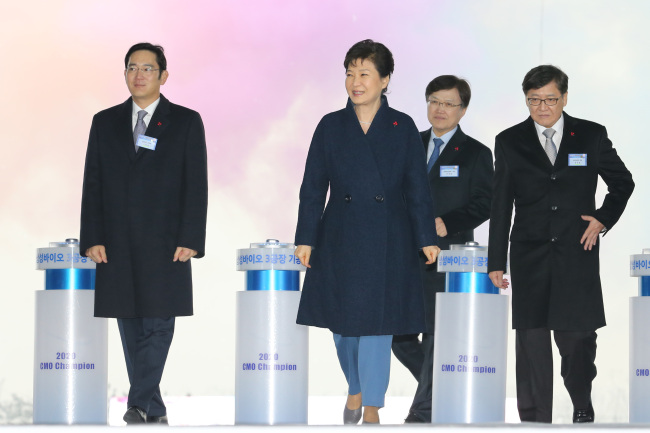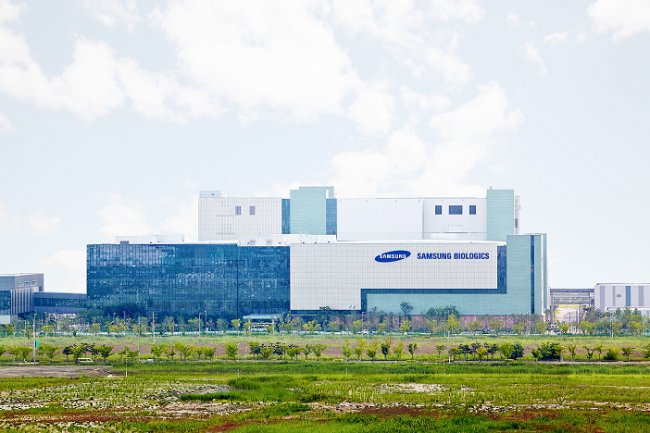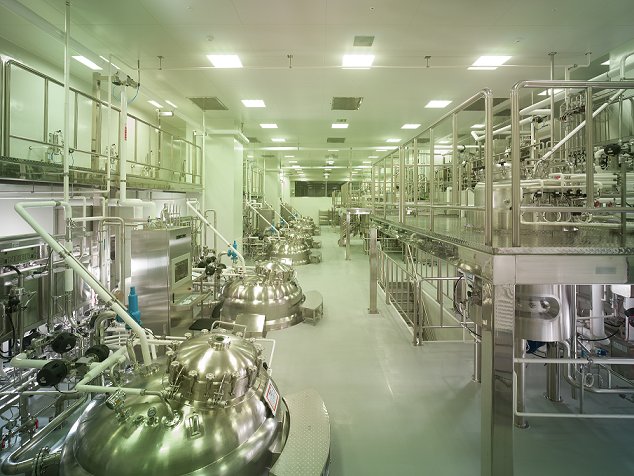SONGDO, Incheon -- Samsung BioLogics broke ground on its third production plant in Songdo, Incheon, Monday, drawing closer toward its stated goal of becoming the world’s No. 1 contract manufacturer of biologic drugs by 2020.
The new plant, to be constructed with an investment of 850 billion won ($740 million) will boast a production capacity of 180,000 liters to become the single largest biologics manufacturing facility in the world upon its completion in 2018.
Combined with its two existing plants, the new facility will drive up Samsung’s total manufacturing capacity to 360,000 liters, leapfrogging current segment leaders Lonza (260,000 liters) and Boehringer Ingelheim (240,000 liters).
 |
President Park Geun-hye (second from left), Samsung Electronics vice chairman Lee Jae-yong (left) and other participants walk off a stage after attending the groundbreaking ceremony Monday of Samsung BioLogics’ third manufacturing plant in Songdo, Incheon. (Yonhap) |
“Samsung BioLogics is looking to become the undisputed No. 1 biologics CMO in terms of manufacturing, revenues and operating profits by the year 2020,” Samsung BioLogics’ chief executive Kim Tae-han told reporters before the groundbreaking ceremony.
The firm is looking to rack up 1 trillion won in revenues and 400 billion won in operating profits by 2020, and record 2 trillion won in revenues and 900 billion won in profits by 2025, when all three plants kick into full gear, according to Kim.
“Samsung’s latest investment will become an innovative model for Korea’s manufacturing sector and set an important foundation for Korea’s foray into the upcoming bio-economy age,” said President Park Geun-hye in a congratulatory speech.
Samsung BioLogics has particularly set its sights on shifting the current production paradigm in the biopharma segment from self-production to outsourcing, as was the case with semiconductors prior to the 1980s.
 |
Samsung BioLogics` second plant in Songdo, Incheon (Samsung BioLogics) |
“Right now, contract manufacturing takes up only about 20-30 percent of global biopharma companies’ total production volume,” said the Samsung BioLogics CEO.
“By supplying high-quality products at competitive prices, as Samsung did when it first jumped into the semiconductor manufacturing business, we hope that global biopharma companies will partner with CMOs like us over investing huge sums of money into expanding their own facilities,” he said.
As production demands for biopharmaceuticals will peak in 2020 amid the introduction of new commercial biologic drugs every year, Samsung, boasting record-low operational costs, will be able to retain an upper hand above competing biopharma CMOs, according to Kim.
In terms of return on investment, Samsung’s third plant is able to produce biologics at around 43 percent of the cost of its global competitors, according to Samsung’s calculations based on investment to capacity ratios.
The Songdo-based company is currently manufacturing commercial biologics developed by its two current partners, Bristol-Myers Squibbs and Roche, at its first plant, which received approval from the U.S. Food and Drug Agency on Dec. 1.
 |
The bioreactor hall inside Samsung BioLogics` second plant (Samsung BioLogics) |
In terms of striking further supply contracts with new clients, the company has been “securing sizeable deals,” said Yoon Ho-yeol, vice president of Samsung BioLogics’ corporate business operations, noting details must remain undisclosed due to corporate compliance rules.
As its business takes off, Samsung BioLogics plans to build a fourth and a fifth plant in the coming years, as well as consider the viability of an initial public offering in 2016, said Kim Dong-joong, the company’s vice president of corporate management.
By Sohn Ji-young (
jys@heraldcorp.com)







![[Exclusive] Hyundai Mobis eyes closer ties with BYD](http://res.heraldm.com/phpwas/restmb_idxmake.php?idx=644&simg=/content/image/2024/11/25/20241125050044_0.jpg)
![[Herald Review] 'Gangnam B-Side' combines social realism with masterful suspense, performance](http://res.heraldm.com/phpwas/restmb_idxmake.php?idx=644&simg=/content/image/2024/11/25/20241125050072_0.jpg)

